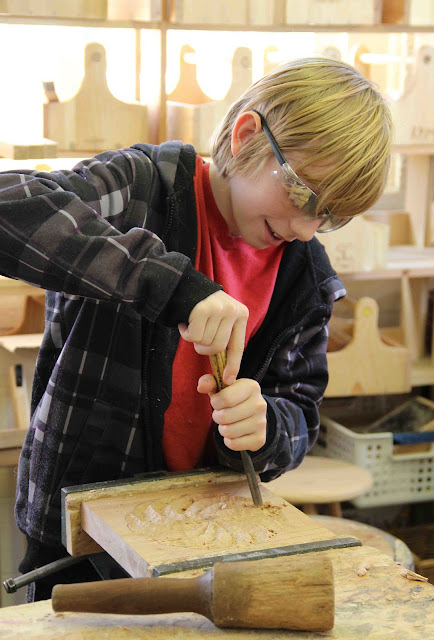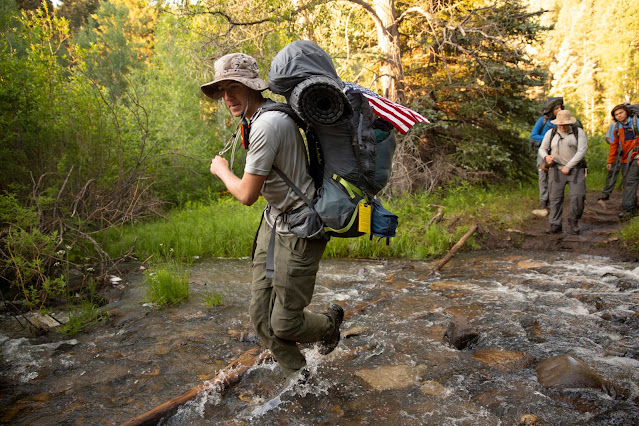"Leave a place (campsite) better than you found it," is another phrase that is quite valuable. Don't litter, don't vandalize, and clean-up after you use something.
At night, each troop hosted a campfire to mingle with scouts from nearby counties and remote parts of the state. Jamborees involved a larger convention of scouts, including internationals.
Meeting new people and being accepting of different cultures was evocative of the baron's original beliefs of inclusion.
Those sensible values stay with me.
My troop did whitewater rafting along the rocky rapids of the Delaware River! (It and the State of Delaware are named for an English baron named De La Warr. That noble family still exists; the 11th Earl De La Warr lives successfully in London).
We slept in log cabins in the Adirondack Mountains. Like mountaineers, we reconnoitered the forests of Mohawk Mountain in the Berkshires highlands. Sometimes, our hikes through National Parks necessitated a backpack with a sleeping bag... which taught me stamina.
We camped on the snow in tents in winter, which I refuse to repeat.
A pleasant winter weekend was spent at a scenic lodge for cross-country skiing.
On other excursions, we caught catfish on trawlers in the Atlantic Ocean. We went whale-watching by Montauk Point Lighthouse. (Erected in 1797, it's the fourth-oldest in America, and it's a national landmark).
To attend Summer Camp, we sojourned to Baiting Hollow in Suffolk County, NY.
We also drove 170 miles—across two state borders—to the 1,800-acre Camp Yawgoog in Rhode Island.
We either slept in lean-tos or army-style tents and shared "rustic" latrines.
Abiding with the rhythm of Nature, a bugler started and ended our days by performing Reveille and Taps.
Each morning, we paraded to the Parade Ground, where we grouped into formations for the Raising of the Flag Ceremony. We all learned how to properly fold or unfurl/hoist the flag. As scouts, we used our own trademark three-fingered salute.
Scouts also use a unique handshake. It originated from Ashanti warriors whom the baron met in Africa.
Some evenings, the various troops congregated for fireside skits. Many were truly funny. One accurately taught the importance of "being able to communicate so somebody else knows exactly what to do". (I still use those skills, which are helpful during "remote meetings" and when I "talk someone through something" on the phone).
BSA offers Physical Education because it is important for kids to collaborate, learn coordination, compete for awhile, and recharge.
Unlike most groups that play sports, the overall theme for Scouts was always "It's not whether you win or lose, but how you play the game."
Scouting promotes literacy, craftsmanship, and problem-solving skills—all vital to the overall development of critical thinking. Aside from whittling a stick to roast hot dogs, boys also learn history, science and the arts.
Only three years after the publication of Scouting for Boys, the famous author, H.G. Wells, wrote, "There
suddenly appeared in my world a new sort of boy: an agreeable development of the town-bred
youngster in a khaki hat, with bare knees and an athletic bearing, who earnestly engaged in wholesome and invigorating games. He was a Boy Scout."
Quickly
spanning the globe, Scouting leaped to America. "Chief Scout Citizen" President Theodore Roosevelt reminded scouts in 1913 that "manliness in its most
rigorous form can be and ought to be accompanied by unselfish consideration for
the rights and interests of others."
Long before "diversity trainers" appeared, the scout law urbanely
told boys to "respect the convictions of others in matters of custom
and religion."
American Scouting entered its heyday after World War II. The
scouts thrived "when America believed in itself," as painter and Boy
Scout illustrator Norman Rockwell recalled (his painting above).
However, 1960s/70s counterculture and the BSA were a train wreck waiting to happen. Here was a supremely service-oriented institution suddenly up against a movement celebrating
rebellion. In
1969, membership dropped for the first time in its history; it nose-dived
throughout the 1970s. Perhaps that was the impetus for the BSA's emphasis on minority recruitment. Consequently, when I became a scout, I belonged to a well-rounded and fully integrated troop of varied nationalities, religions, and races. It was a great education of cultures. It was a thing of pride to wear your
uniform on the streets, alongside one another.
Sartorially, my Scoutmaster chose for our troop to wear the traditional "campaign hats". That type of hat has heritage.
In other troops, the scouts upturned/folded one edge.
It was spiffier than the typical cap...
During summer camps, parades, and Jamborees, we were admired by other (envious) scouts, who complimented our handsome appearance! Only the scouts who wore berets might've looked more stylish.
I used it to my advantage. Wearing that hat and uniform added authority to my fundraising pleas, as well as my requests for teamwork among other campers.
Of special pride to scouts is their merit-badge sash, wrapped around them.
Every one of those badges represents
an achievement; no one "gave" them to you. At a time when
government is creating a dependent class, Scouting insists that nothing comes
for free. Merit badges are awarded, not
on the basis of economics or skin color or politics, but according to individual accomplishment. Earning them involves partnering with another adult or a professional in the community. I fondly recall completing the requirements for my favorites: Personal Fitness, Citizenship in the Community, Citizenship in the World, Cooking, Environmental Science, Hiking, Dentistry, Native American Lore, Astronomy, Lifesaving, Music, Art, Public Speaking, Swimming, Exploration, and Photography.
The same goes for earning your Order of the Arrow sash (the BSA's National Honor Society), which I did.
It involves meeting elite requirements and completing an "ordeal" project. During the "ordeal", initiates sleep apart from other campers, maintain silence, and work on camp-improvement projects. The induction ceremony occurs by firelight.
Scouting is full of insignia, emblems, and badges! As a youngster, you can hold varied ranks:
(I wish they'd had a badge for this… ha ha!)
I can assure you, you do
internalize the Scouting values. A 1996 Lou Harris study indicated that men with Boy Scout experience placed a higher value on honesty and
integrity than men without it.
The promise of Scouting—a universal brotherhood regardless of demographics—is amazing. It doesn't matter if you're the high school football star or the nerd. Currently, troops are wildly diverse with an ethnic
and religious mix. Belonging to a tolerant group is uplifting, and when each Boy Scout Troop marches in municipal parades, they do with pride in themselves and their communities. I fondly recall marching in annual parades through Main Street in the Village of Farmingdale, and also along the turnpike for three miles.
Exemplifying a "soldierly precision" and impressive posture, my friends and I were often selected to be the Color Guard who carried the banners and flags in front of the troop.
After my Scout Troop marched down a local street—during a Veteran's Day parade—an appreciative mother told me that her
son was doing a lot of "interesting things with his hands and mind: camping, archery, tying knots, and building fires." She was amazed that he learned how to use a compass and a map.
I fondly recall cooking food on our campfires (in summer and winter), as well as preparing meals on propane-fueled griddles and barbecues.
Preparing for the big bonfire, we rehearsed funny skits to perform for the other troops.
As outdoor adventurers, we hiked over hills, explored stalactites in subterranean caverns in the Catskill Mountains, climbed walls, and crossed elevated rope-adventure courses.
Being a runner, I easily earned my Athletics merit badge, which was styled with a winged foot to honor the Greek god, Hermes. He protects travelers and is a divine messenger. When the ancient Romans renamed the gods, he became Mercury.
Standing on boats, seashores, and riverbeds, we learned the techniques of fishing and fly-fishing.
*Whenever I eat a line-caught fish, I appreciate the effort that was exerted to catch it.
We learned to cherish Nature's equilibrium and the importance of ecosystem conservation.
With my wood-working skills, I built birdhouses (and I mounted one in my backyard).
As Assistant Scoutmaster was friends with a fellow who owned a propeller-nosed airplane at a private airfield, and some of us got rides in it. It was my first time flying, and I enjoyed being airborne.
We made a day-trip to visit America's elite Army school: West Point Military Academy, and we observed its doctrine. It is also a national landmark.
My troop also visited a Coast Guard barracks and an Army base. We observed their methods, standards, and values.
We toured the U.S. Navy's Intrepid Sea & Air Museum: a retired aircraft carrier that is anchored at a pier in Manhattan.
During years of summer camp, I reveled in opportunities to learn new skills. We painted, whittled wood, and sketched.
Using a mallet, tools, needle and plastic cords, I embossed and sewed a leather case for my pocket-knife.
As a precaution, we learned First Aid...
...before fiddling with our Swiss Army knives (made in Switzerland). Coincidentally, both use the same colors and an equal-ended cross.
I was a quick learner during Bow & Arrow lessons, and my steady aim accomplished "tight groupings" of bullseyes. I added the Archery merit badge to my sash. (20 years later, friends took me to an archery range. I remembered what I was taught, and I impressed everyone—especially the instructor—with my aim).
Relatedly, we progressed to firearms. I easily earned two merit badges: Rifle Shooting and Shotgun Shooting. To avoid harming living animals, our target practice involved Skeet Shooting at clay disks that were mechanically thrown into the air. Such techniques develop dexterity, nimbleness, calmness, and eye-hand coordination. I was "an excellent shot".
Of
course, no one today really needs to know how to build a fire or pitch a tent...
...but Scouting taught persistence in the face of disappointment.
Hiking the Appalachian Trail and the 10-mile Nathan Hale Trail instilled an appreciation for natural beauty and history. (My Timberland hiking boots served me well!)
When it rains and your boots are muddy, you can either weep or you can keep going, knowing it will get better. Thus, we learned the values of persistence and being physically fit.
The same logic applied to my sneakers.
We were taught the obligations of physical involvement and the effects of maintaining a healthy lifestyle.
The "trust exercises" built teamwork: the "fall back" routine and blindfolded "guessing games".
A similar activity was instructing someone how to make a peanut butter and jelly sandwich, while assuming that they knew nothing. The funniest part happened when a scout got frustrated that he couldn't properly describe how to smear the peanut butter, so he shouted, "Screw the peanut butter". The scout who was being "instructed" gave a devilishly-horny smile, and the boy who said it suddenly realized what it could mean! All the teenage boys laughed!
Admittedly, older boys inadvertently or directly taught younger boys about hormonal pleasures. It's part of life.
Scouting is one of the few truly age-spanning activities. Younger scouts look up to older boys, but the age difference never prevented friendships or mutual respect. Older scouts were aware of their duty as role models. They encouraged less-experienced scouts to transition from tentative "firsts" to boldness and confidence.
Teamwork and coordination was also forged when paddling a two-person canoe. The hardest part seemed to be getting into the life preserver vests. Ha ha.
Developing an optimism toward adversity is a key for success.
Scouting is a brilliant method for
infusing children with a set of values that can be especially hard to find. The little details that fill each meeting constantly reinforce
a code of conduct based on self-restraint, neatness, teamwork, good sportsmanship, and courtesy: the
essentials of civilized life. Keeping your uniform in order and standing precisely
in line is not haphazard nagging. They empower scouts to set an example for others. They give kids opportunities to lead, not just boss others around. Besides, how often do
most teens get to serve as positive role models?
In my Boy Scout experience, the greatest
boon was my Scoutmaster, Mr. Hank. A role model. A lifesaver.
For some, he was the only stable adult in a child's life. He welcomed us into his home and into his orbit of adventure. He strove to spread Scouting values to our parents, too. He taught that our every gesture is a moral example—for better or
worse. It was a Socratic dialogue. When I won awards, he was so proud of me that he created handmade wooden plaques for them! (If he liked you, it was a honor that the whole district new about).
The other Troop Leader was Mr. Keane. He admired me and my sincere friendliness with his blind son (whom other boys avoided because he was different than them). Unlike my father, those men were wonderful, upstanding, big-hearted, and gentle-but-firm mentors. Unfortunately,
men like them are hard to find. In America's current atmosphere, there is focus on "making money" and "taking shortcuts". There is a vacancy for decent men to lead scouts.
A few years ago, while the tradition-minded Boy Scouts of the United Kingdom were open-minded to welcome gay members, the Boy Scouts of America (supposedly the "Land of the Free" & "Land of Opportunity") banned gay members. The fiasco of the BSA denying gay men the role of scoutmaster hurt the organization's image, funding, and civic relationships.
As a gay man, it strikes a chord inside me, to watch the events unfold, including Eagle Scouts returning their medals in protest.
I see men and boys rebuffing the Boy Scouts of America's ignorant decree. Gay youths and adult supporters wear their colors with pride.
Cultivating a love of country in boys is a cure for alienation; it centers them in an identity and informs them that this is their country, too. The same goes for Teamwork, Togetherness, Community, and Conservation.
When I see my neighbors carrying bags up the building's stairs, I help them
automatically. I hold doors for people. Yet, laughably against the cliché, I've never yet helped a little old lady across the street. Happily, "Scout Spirit" and good manners still flow from their well-planted roots. Hopefully a wider array of supporters will sustain the upstanding program for the developing future.
*Amendment to that: like many wholesome things that try to survive in the squalor of the USA, the Boy Scouts of America disintegrated. It filed for bankruptcy in February 2020. Such an occurrence is a terrible shame, and it's indicative of how things operate in America.
Thankfully, the "Scouting Spirit" is alive in other parts of the world.













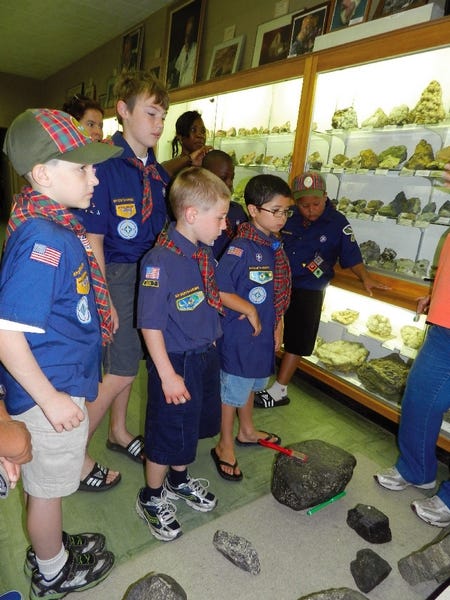


























































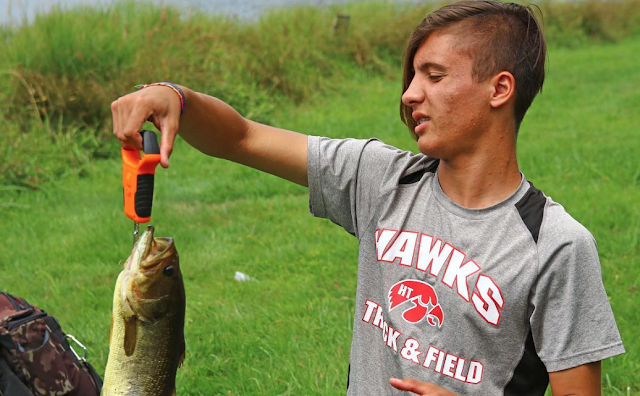










.jpg)

















.svg.png)



























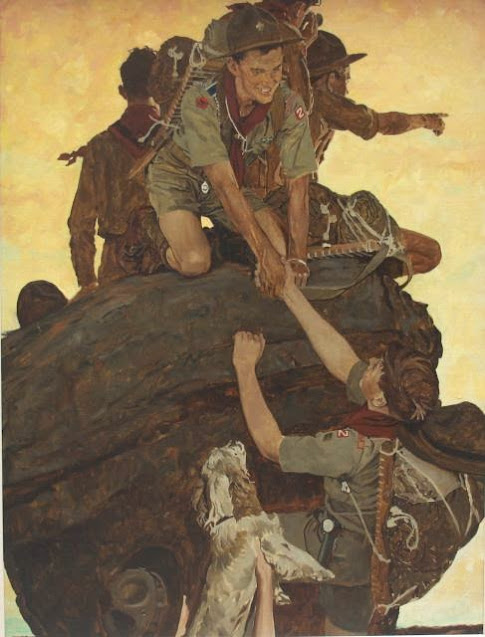

























































-resized341250343.jpg)























